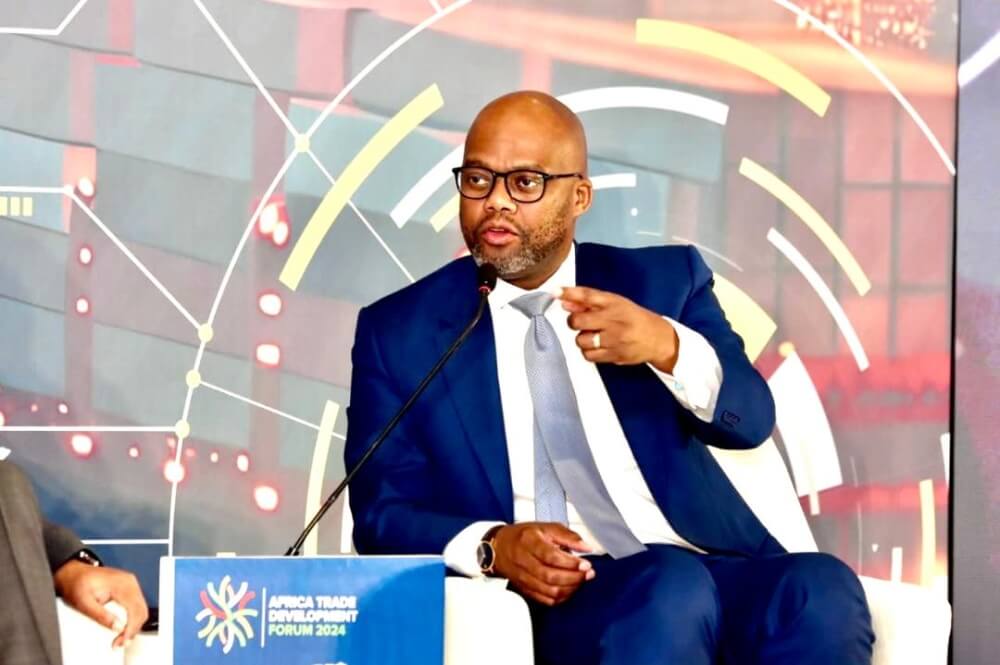
Our Projects are
Transforming African Trade
Quick Contacts
2nd Floor, Fidelity Insurance Centre Waiyaki Way, Westlands

The Secretary General of the African Continental Free Trade Area (AfCFTA) Secretariat, Wamkele Mene speaks during the Africa Trade Development Forum in Kigali on Monday, December 2. Courtesy.
Africa has achieved different levels of digital trade, with some regions making more progress than others. Work must be done to connect the scattered dots and ensure the continent becomes a single digital market.
The appeal was made by various leaders at the just-concluded Africa Trade Development Forum in Kigali, co-hosted by the government of Rwanda and TradeMark Africa.
The forum was held under the theme, ‘Unlocking Africa’s trade potential through digital innovation.’
ALSO READ: How digitalisation is transforming trade in Africa
The Secretary General of the African Continental Free Trade Area (AfCFTA) Secretariat, Wamkele Mene, cited the AfCFTA Digital Trade Protocol (AfCFTA DTP) as one of the ways digital trade fragmentations can be addressed on the continent.
“We have seen how digital technologies have enabled trade and made it more efficient especially in the East African region. The AfCFTA DTP intends to consolidate all these efforts and create a single digital market,” he said.
The AfCFTA Digital Trade Protocol was adopted in February 2024, with negotiations still ongoing on annexes such as rules of origin and cross border digital payments.
According to Annette Ssemuwemba, Deputy Secretary General Customs, Trade and Monetary Affairs at the East African Community, more still needs to be done to ensure a seamless flow of trade in the region.
“The electronic single windows were meant to be integrated so that we are not speaking of these in individual countries, but a single window in the region,” she said, adding that systems such as the electronic cargo tracking systems are also yet to be integrated.
She also noted that digital corridors would go a long way to make trade faster and more efficient with minimal human interactions.
Policies and regulations
Ssemuwemba indicated that Africa does not have a problem of policies and regulations. Instead, she argued that these are in abundance although implementation remains a challenge.
“We don’t need more policies, we already have sufficient policies, regulations, guidelines and strategies in place. What remains is implementation,” she said, adding that the policies must be actioned.
According to Haile Mariam Desalegn, Board Chair of TradeMark Africa, policies in the region are also fragmented.
“Our policy and regulatory environment in Africa is fragmented, hampering implementation. All this comes down to the leadership in our countries,” he said, adding that the continent needs strong coherent leadership that will help harmonise these policies.
Desalegn also called on African governments to facilitate and support the private sector to thrive in trade.
“Africa has many cases of market failures and governments need to intervene in situations where the private sector is either unwilling or unable to make investments,” he said.
The continent also needs adequate financial investments in digital trade, without which its potential will remain untapped.
ALSO READ: How new Pan-African payment system will boost AfCFTA implementation
Haytham El Maayergi, the Executive Vice-President, Global Trade Bank said, “Africa must find innovative ways of raising capital domestically and investing in its own digital future.”
Maayergi also encouraged African countries to make use of the Pan-African Payment and Settlement System (PAPSS) to pay for intra-African trade transactions in their local currency, reducing the costs and accelerating the payment of trade transactions.
African traders have had to use foreign currencies, often the US dollar or Euros, to settle payments amongst themselves, creating foreign exchange and liquidity pressures in many African countries.
PAPSS is expected to save businesses across the continent $5 billion in transaction costs annually.
Digital trade holds immense promise and opportunity for Africa to increase its share of global trade, which has remained marginal, according to the International Finance Corporation (IFC).
Improving regulatory frameworks, increasing investments and working together to avoid fragmentation could help the continent leverage digital trade and drive economic growth.
Disclaimer: The views and opinions expressed in this article are those of the authors and do not necessarily reflect the official policy or position of TradeMark Africa.